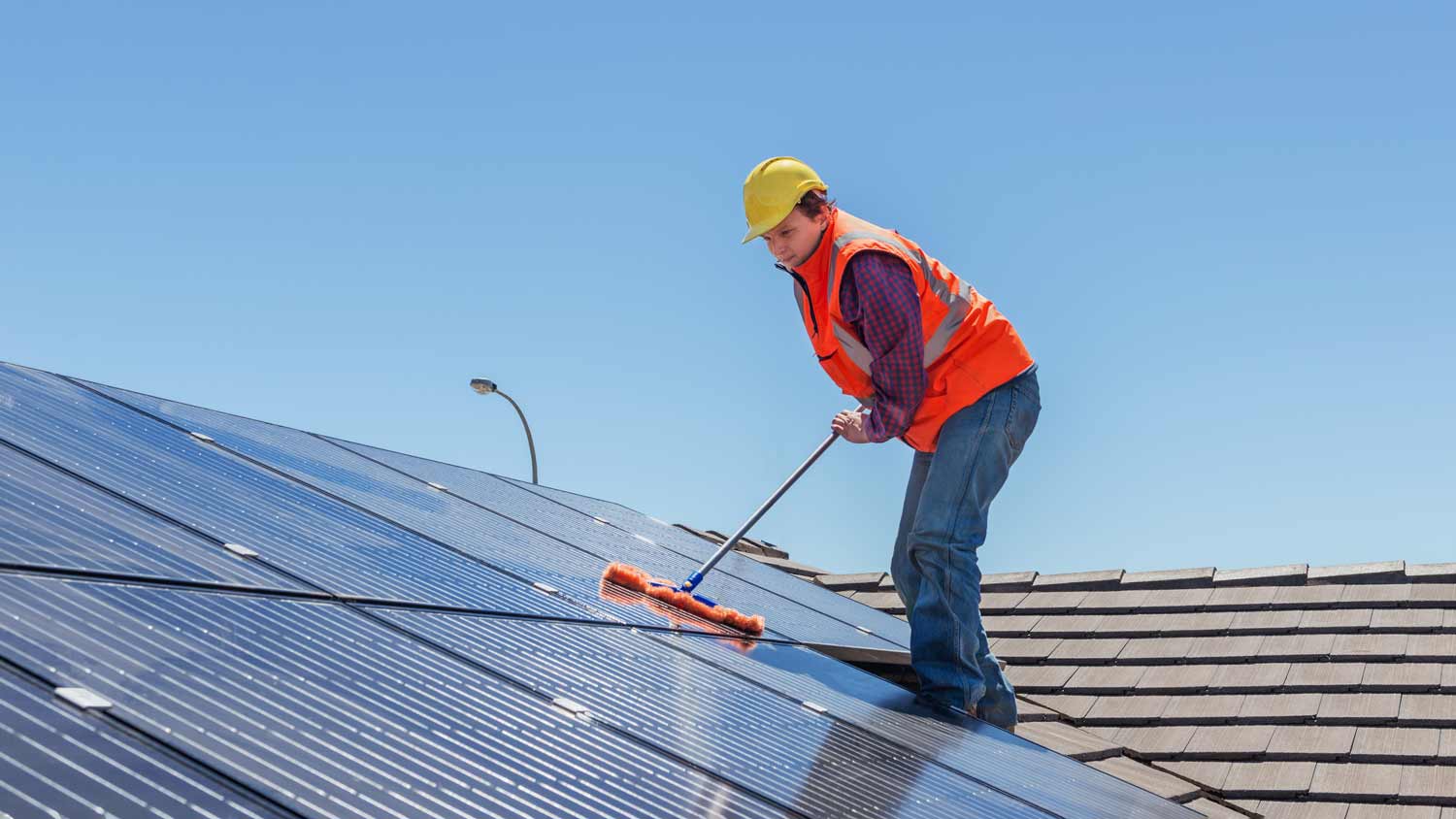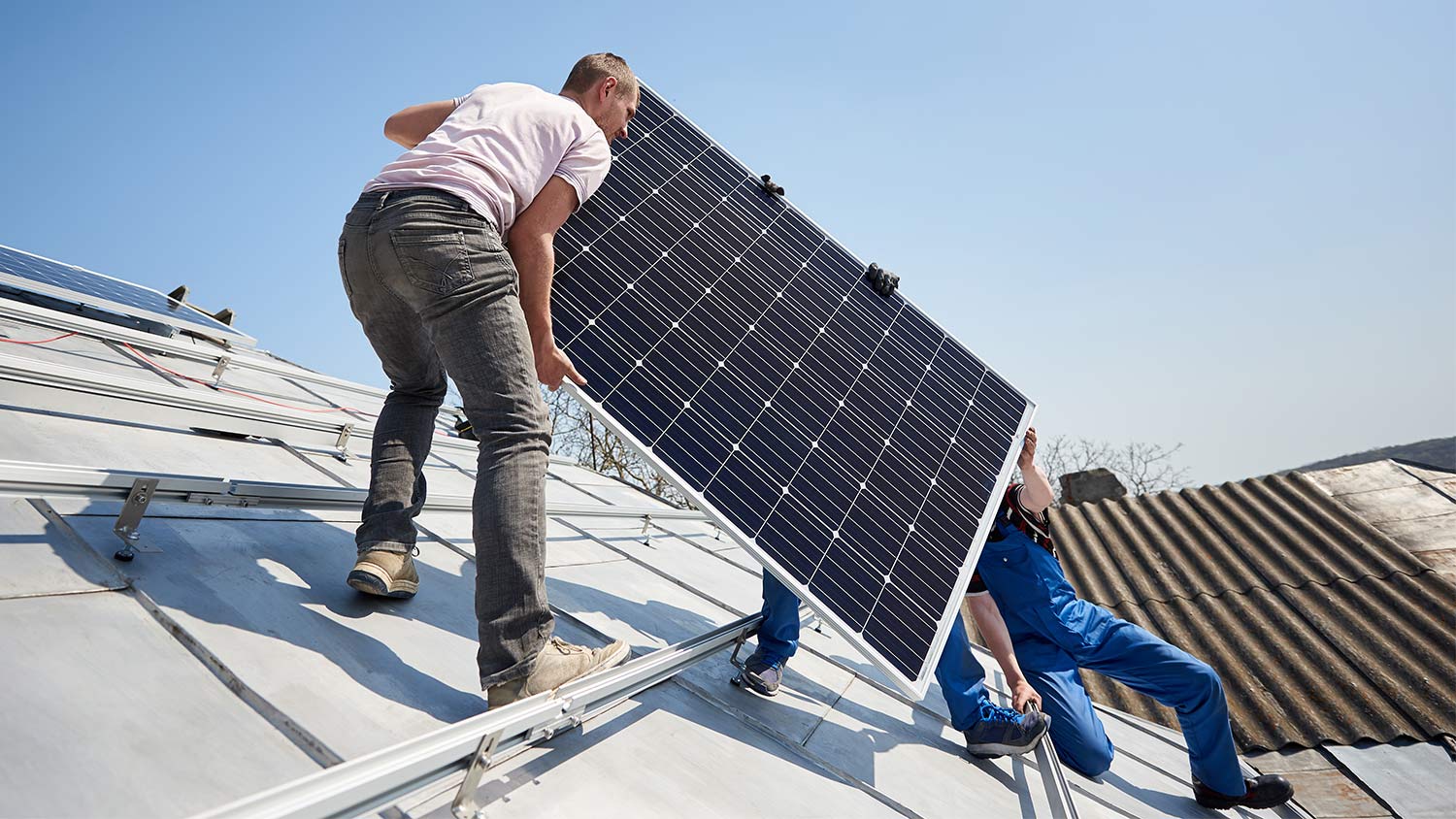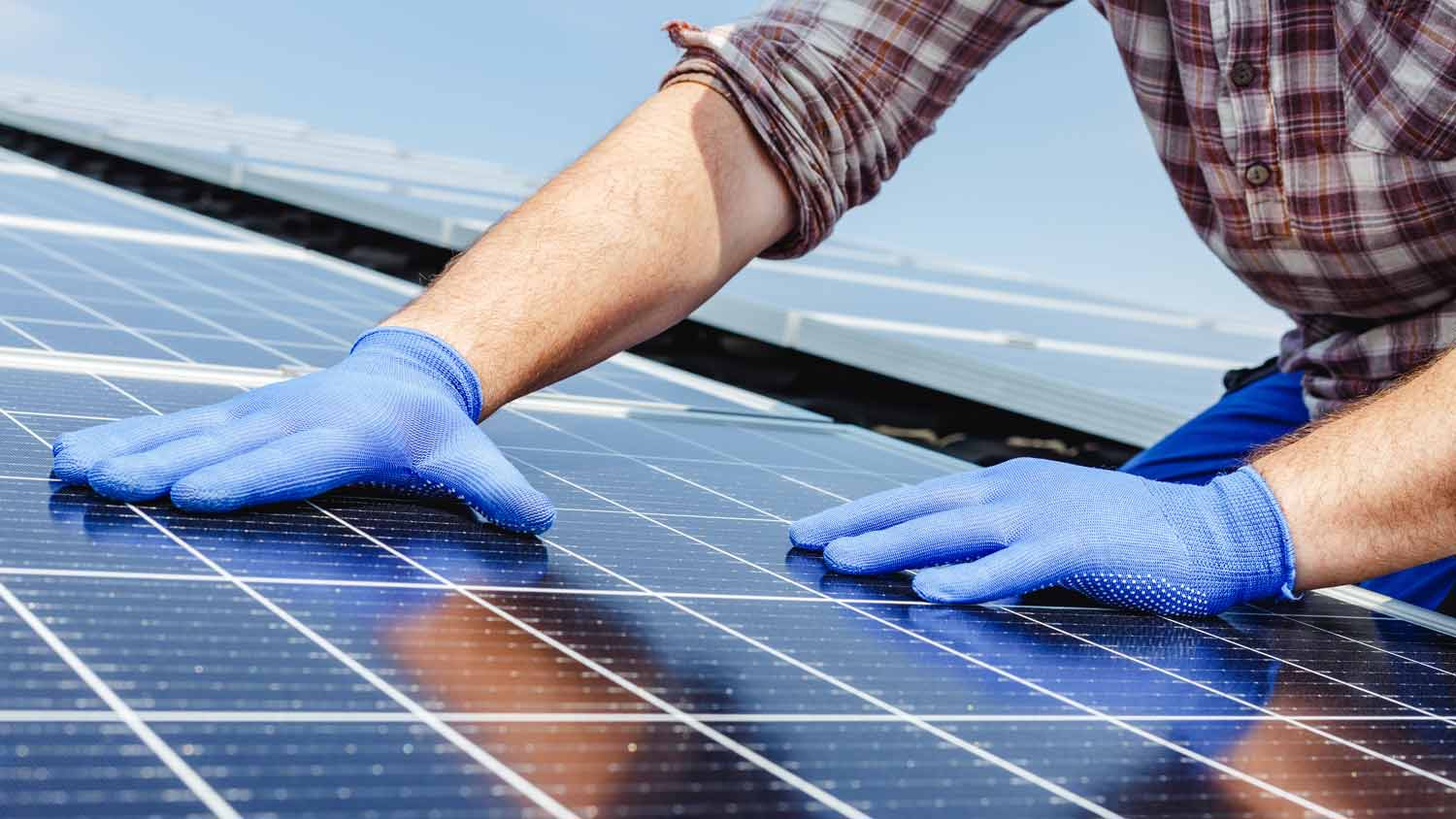
Use this guide to budget for home solar battery costs based on factors such as system size, battery type, professional installation, storage, and more.


The cost of solar panels in Virginia averages $26,400 but can range anywhere from $4,500 to $50,000 for a complete project. Most homeowners' solar panel costs in Virginia run $18,400 to $35,500. These prices are before the 30% federal tax credit for the project, plus other state and local incentives.
Most installations in Virginia produce about 3kW to 8kW of energy, and most residential systems can sell excess electricity back to the grid. Although the overall project costs can front load expenses, over the long term, you can expect the system to pay for itself in as few as 10 years.
| Average Cost | High Cost | Low Cost |
|---|---|---|
| $26,400 | $4,500 | $50,000 |
In Virginia, you’ll pay $3.03 per kilowatt for solar equipment. This means that the average 10kW system costs $30,300 total. That price includes a battery bank and all materials, which usually come with the system. If you purchase your own parts, you can get a bank separately. Solar battery banks cost $300 to $15,000, with prices fluctuating depending on availability.
| Virginia Solar System Size | Average Solar Cost* |
|---|---|
| 3kW | $9,100 |
| 4kW | $12,200 |
| 5kW | $15,200 |
| 6kW | $18,200 |
| 7kW | $21,200 |
| 8kW | $24,300 |
| 10kW | $30,300 |
| 12kW | $36,400 |
| 15kW | $45,500 |
*Does not include federal or state rebates or incentives.
The solar panel cost in Virginia varies by city, but will generally fall between $18,000 to $36,000 depending on your project’s size.
| Solar Installation Cost per Virginia City | Average Project Cost* |
|---|---|
| Virginia Beach / Chesapeake | $14,800 – $35,400 |
| Richmond | $15,600 – $37,500 |
| Roanoke | $14,500 – $35,000 |
| Newport News | $16,600 – $39,700 |
| Arlington | $16,100 – $38,800 |
*Includes labor and all materials
The solar panel cost in Virginia Beach, VA, runs $2.95 per watt on average, or $14,800 to $35,400. It’s slightly less than the average across the state, which is unusual for an urban center. Multiple factors can affect overall pricing in an area, including local building standards and levels of competition.
In Richmond, VA, you’ll pay $3.15 per watt on average or $15,600 to $37,500 for the average sizes of solar systems. Richmond actively campaigns to transition the city to clean solar power through its SolarizeRVA program.
In Roanoke, VA, you’ll pay $3.05 per watt or $14,500 to $35,000 for the average sizes of solar systems. Roanoke also participates in various solar incentive programs, such as the Solarize VA program. However, you’ll need to check with the city government’s website for current programs.
In Newport News, VA, plan to pay $3.30 per watt on average for residential solar system installation, or $16,600 to $39,700. Newport News city government is currently working to promote going solar for residents, but currently only with educational materials.
In Arlington, VA, you can expect to pay $3.25 per watt on average for your solar setup, or $16,100 to $38,800. Arlington has a plan to become carbon neutral by 2050, and as part of that plan has created Arlington 2022 Solar and EV Charger Co-op program that helps resident members get solar panels at about 20% off retail prices. Although they are not currently taking new members, they do have a waitlist available.
Solar panel price factors include the type of panel you get, what the permits in your area cost, the pitch of your roof (if it’s extremely steep or flat), and how much maintenance you’ll need to perform yourself. Check with your local solar installer if your project estimate includes any of these factors.
Solar panel prices range from $1 to $3 per watt, often based on the type of purchase. You’ll get to choose from Monocrystalline (and PERC), Polycrystalline, and Thin Film.
Monocrystalline: about $0.05–$0.10 more than polycrystalline. They’re the most expensive option but generally the most efficient. PERC cells are a type of monocrystalline.
Polycrystalline: Cost slightly more than thin film panels but aren’t as efficient as monocrystalline, meaning a lower initial cost, but it takes longer to recuperate your investment.
Thin film panels: are easier to install and require less hardware, making them the least expensive option.
You’ll want the pitch of your roof around 30 degrees. If you have an extremely steep or flat roof, you may need to use brackets to angle the panels correctly. Steep roof installation might cost more since your contractor will likely need to install rigging and safety equipment.
Panel brand makes little difference in the final cost of your project. It’s more important to use a brand trusted for its longevity and durability. Saving a few dollars on the installation by using an off-brand may end up costing you more in the long run. Typically, it’s wise to use the brand that your professional recommends or provides a warranty for.
Labor costs make up about 20% to 50% of the total solar panel project cost. Most projects only take a day or two to complete, depending on your roof’s size and accessibility. Your pro will take care of permits, but they tend to take longer than the installation itself.
Solar panel maintenance costs $100 to $350 per visit. Panel cleaning is generally all the maintenance you’ll need, besides an annual inspection to check for corrosion and damage from weather and wildlife. Clean your panels regularly; dust and dirt lower how much energy they can produce. Solar panel repairs cost $300 to $1,300 and usually require replacing panels or brackets.
Inverters come in multiple types in Virginia. You’ll choose from a single inverter that can cost $1,500 and up or microinverters that cost $150 and up for each panel plus $100 to $200 in labor to install. Your utility company will know which works best if you’re in a net metering area.
There are several local rebates in Virginia, and you’ll want to check with your city and county governments to see what programs are available. In some places, low-income homes can qualify for upgrades at no cost to themselves.
If you install Solar PV systems before 2034, you’ll receive a Federal Solar Tax Credit of 30% with no maximum cap.
Renewable Energy Credits (RECs) let you earn tradable credits for your system.
Net metering for energy so you can sell back excess energy you make, so long as your residential system doesn’t exceed 25kW in power generation.
It’s possible in some cases to have solar upgrades to your home exempt from property taxes.
Virginia ranks near the top of all states for going solar since it has more than four hours of sunlight a day, on average. With tilting and moving panels, you can get even more. It’s not only an excellent state to put up solar due to daylight, but there are numerous programs and plans to help educate and inspire residents to move to solar and other renewable forms of energy.
Most VA residents with solar avoid between $30,000 and $65,000 in electric bills over the life of the panels (about 25 years). You can also have a battery bank that stores electricity during peak usage hours.
Panels pay for themselves in about 12 years, netting most homeowners about $20,000 in lifetime savings.
Virginia sees an average of 4.7 peak sun hours per day.
You can sell your electricity back to the grid in Virginia. However, the state caps how much you can sell back to prevent a rise in energy costs.
From average costs to expert advice, get all the answers you need to get your job done.

Use this guide to budget for home solar battery costs based on factors such as system size, battery type, professional installation, storage, and more.

Budget for solar panel repair costs based on factors such as system type, panel size, accessibility, repair type, labor, parts, inspections, and more.

Wondering who repairs solar panels? Learn who to call—solar technicians, installers, or electricians—and when to DIY. See costs and smart next steps.

Who to hire for solar panel maintenance? Learn if a solar repair company or electrician is right, what they do, and typical costs

Who installs solar panels? Learn who to hire—certified installers vs electricians—and which certifications protect permits, safety, and your warranty.

Who to hire for a solar panel inspection for a new home? See whether to call a certified solar installer or electrician and what they check